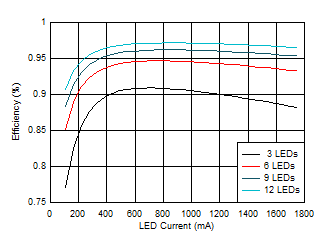SLUUCC4A October 2020 – September 2021 TPS92520-Q1
- Trademarks
- General Texas Instruments High Voltage Evaluation (TI HV EMV) User Safety Guidelines
- 1Description
- 2Performance Specifications
- 3Performance Data and Typical Characteristic Curves
- 4Schematic, PCB Layout, and Bill of Materials
- 5Software
- 6TPS92520EVM-133 Power Up and Operation
- 7Revision History
3 Performance Data and Typical Characteristic Curves
Figure 3-1 illustrates the efficiency results for the TPS92520EVM-133 versus output power for different input voltage VIN.

Conditions: VIN 60 V,
fSW = 437 kHz
Figure 3-1 Efficiency vs LED Current